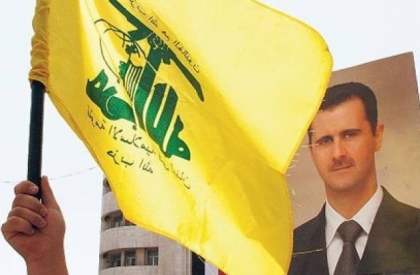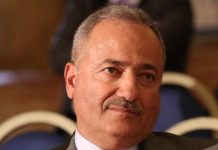The Lebanese Army is being sucked into Syria
Michael Young| The Daily Star
25.09.14
The rising number of attacks against the Lebanese Army in Arsal and northern Lebanon is a worrying reminder of what is at stake for the military. In entering the fray in Arsal, the Army has immersed itself in the treacherous dynamics of Syria’s civil war.By trying to close off the Lebanese-Syrian border, a legitimate aim in principle, the Army is effectively participating in strangling the Syrian rebels in the Qalamoun district. The rebels rely on access to Arsal to resupply themselves and to rest. With winter coming, the rebels realize that they will have to come down from the high ground in Qalamoun, and if they are denied access to Arsal, they will have to find alternatives, leaving them more vulnerable to attack by the Syrian regime and Hezbollah.
The Army can say that it is trying to guarantee that the conflict in Syria does not reach Lebanon. That would be convincing if Hezbollah had not deployed thousands of combatants in Syria, and if negotiations over the release of the abducted soldiers had not been hindered by the party, because it wants its own members captured or killed in Syria to be part the deal.
It would be even more convincing if we did not know that Hezbollah has played a significant role in pushing the Army to take a more aggressive stance in Arsal than it has previously taken. The reason is that the party is struggling in Qalamoun, caught in a war of attrition that it cannot win against a motivated foe with nothing to lose.
So, Hezbollah has maneuvered the Army into serving as its partner. To lend this legitimacy, it has been depicted as an anti-terrorism campaign against Salafist-jihadists such as the Nusra Front and ISIS. But how accurate is that portrayal?
In private conversation, a Lebanese ally of Syria admits that the bulk of the armed men in Qalamoun are inhabitants of the area who were forced to evacuate their towns and villages when the Syrian army and Hezbollah went on the offensive last year. That is not to say that there are no jihadists among them, let alone to play down the murder of soldiers; but rather to suggest that the picture is more varied than the Army’s public relations arm has let on and media have been led to believe.
What are the options for the Army? Today it has no real strategy in the Arsal hinterland, and is setting itself up for a grinding battle without resolution. Soldiers will continue to be the target of attack; the hostage situation will remain stalemated; and the country will continue to shake to the repercussions of the Arsal situation. Sectarian tensions in the Bekaa Valley may worsen given that the state and political parties have only a limited capacity to control their communities there.
Under these circumstances it may be preferable to consider a de facto agreement with the rebels governing passage to and from Arsal, in exchange for the release of the abducted soldiers and policemen and a clear definition of the conditions for entry and exit. This would include ensuring that weapons will not cross the border, only food and humanitarian supplies.
Hezbollah would doubtless oppose such an arrangement, and could be expected to block it on the ground. But there are circumstances that could make the party more open to an implicit accord.
For starters, given the stalemate in Qalamoun, Hezbollah has an interest in maintaining channels to the opposition in the event more of its fighters are made prisoner. Because of the unlikeliness of a total cutoff of communication lines between Arsal and Qalamoun, it may be preferable for both sides to get something out of a deal as opposed to what they might lose by refusing such an alternative.
Hezbollah also must think of the future. The Syrian regime is slowly losing ground everywhere. Its armed forces are depleted and the casualty toll among Syria’s minorities, especially Alawites, is high and unsustainable. Even in the best scenario, if ISIS is beaten, which is unlikely in the coming weeks, the regime cannot regain what it has lost.
Given all this, Hezbollah gains from being flexible. If Bashar Assad and the party cannot prevail militarily in Syria, Hezbollah may eventually have to consider a fallback strategy to contain the consequences of the Syrian conflict inside Syria. Having already reached a modus vivendi with rebel groups in the border area could become very useful if that occurs.
There are those who believe that, despite the dangers of a sectarian war in Lebanon, the armed men in Qalamoun have no intention of extending the Syrian conflict to Lebanon. That could well be true, but don’t take anybody’s word for it. Hezbollah is a prisoner of two contradictory logics: It wants to help the Assad regime win in Syria, and it wants to ensure that the Syrian violence is kept out of Lebanon. The first objective, almost by definition, has undermined the second.
However, the contrary is less evident. A desire to keep Lebanon separate from the Syrian conflict need not weaken Assad, and an implicit deal in the area of Arsal may show why. While it is improbable that Hezbollah will embrace such a reality, the Lebanese Army can tell the party that it refuses to be drawn into Syria, and intends to find a means to ensure this.
It can do so with Hezbollah’s approval or not, but the Army is in a better position to impose an arrangement, one that does not harm the party’s interests, because Hezbollah is vulnerable. The Army is not doing enough to stay clear of the Syrian war, and this can benefit only Hezbollah and Assad.
**Michael Young is opinion editor of THE DAILY STAR. He tweets @BeirutCalling.























